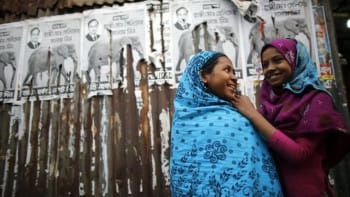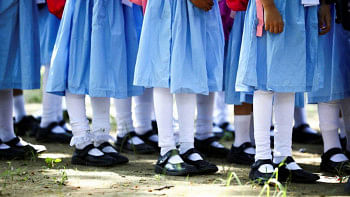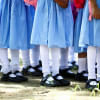Rasulpur shows what needs to change for child marriage to end

Despite there being a specific law against child marriage and many awareness campaigns and ongoing efforts to prevent this practice across the country, the harsh reality is that child marriage is a curse that still persists stubbornly. In remote areas such as chars, where life is particularly hard, the situation is more dire. A report published by this paper on Saturday paints a grim picture of hundreds of child brides at the Rasulpur char in Barishal. Parents here are forced to marry off their minor daughters because of poverty and insecurity.
Poverty, it goes without saying, has always been a major factor behind child marriage, which increased manifold during the pandemic but persisted in subsequent years as well. According to a recent Bangladesh Bureau of Statistics (BBS) report, a staggering 41.6 percent of young women were married off before the age of 18. This led to many girls dropping out of education at the secondary level, severely compromising their future potential. An uptick in sexual violence and harassment is also directly related to this evil.
In Rasulpur, girls as young as 13-15 are often married off and subsequently forced to take on the responsibilities of adulthood. This includes having children at a very early age, leading to all kinds of health complications. There are no doctors or community clinics, and so many married girls develop pregnancy-related complications that are left unattended. The char is also notorious for being a major drug hub with local influentials and some members of the police being allegedly involved. The safety of young girls is, therefore, a big issue leading to so many child marriages.
Rasulpur is a blatant example of the utter neglect of local administrations towards the welfare of poorer households and neighbourhoods. Here, there are no wholesome recreation options for young people and very few opportunities for education. Instead, the drug trade thrives bringing with it waves of crime, addiction and insecurity. Locals are left to deal with these challenges on their own and, finding no recourse, marry off their daughters to protect them.
We must reverse this cycle of events. The government should focus more on chars like Rasulpur; it must cleanse the local administration of corrupt officials, clamp down on drug trade, establish more schools and healthcare centres there, and introduce youth centres that can create awareness of the devastating consequences of child marriage and drug addiction. The government also must initiate programmes to lift char people out of poverty, create education and employment opportunities for both boys and girls, and enforce the law against child marriage. Without such interventions, this curse—a formidable obstacle to the nation's progress—will not be eradicated.


 For all latest news, follow The Daily Star's Google News channel.
For all latest news, follow The Daily Star's Google News channel. 











Comments